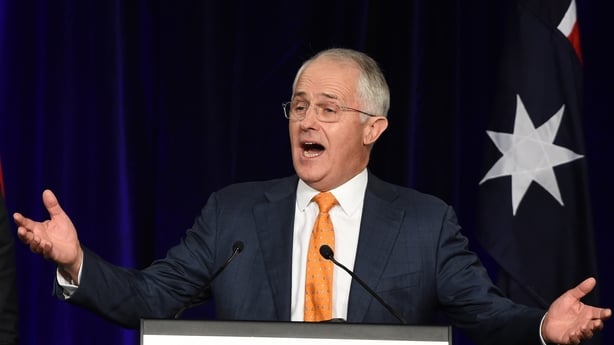Australia was headed for a hung parliament or a minority government with more than half the votes counted in a national poll today, potentially blocking Prime Minister Malcolm Turnbull's ability to enact key economic reforms.
Official electoral data for the House of Representatives showed a 3.2% swing away from the Liberal-led coalition government as officials clocked off for the evening with almost 10 million votes counted.
The tight vote is a major blow for Mr Turnbull whose gamble on a risky double dissolution of parliament, in a bid to oust intransigent independents in the upper house Senate blocking his agenda, appears to have backfired.
"Friends, we will not know the outcome of this election tonight, indeed, we may not know it for some days to come," a jubilant Bill Shorten, leader of the opposition Labor Party, told supporters in Melbourne. "But there is one thing for sure - the Labor Party is back."
Opinion polls heading into today's vote had showed a potentially tight vote after the landslide victory that brought the coalition to power in 2013; but just how tight still caught many by surprise.
Former prime minister Tony Abbott told Liberal Party followers it was a "difficult night" after he successfully retained his Sydney seat.
On official projections issued as counting was wound up, the coalition was expected to hold 68 seats, against the opposition Labor Party's 70 seats and five to independents and the Green Party.
With just seven seats left to be determined in the House of Representatives, it was unclear if the coalition would win enough to form a government without an alliance with small parties and independents to get a majority.

"It is a very, very close count," Mr Turnbull (above) told the party faithful at coalition headquarters in Sydney after Mr Shorten spoke. "I can report that based on the advice I have from the party officials, we can have every confidence that we will form a coalition majority government in the next parliament."
Still, there were early rumblings about Mr Turnbull's future given the closeness of the vote. Mr Turnbull had some of the highest poll ratings of an Australian leader on record shortly after he snatched the top job from Tony Abbott last year.
But that popularity soured as he appeared to bend his centre-right values on issues like climate change and same-sex marriage to the right-wing powerbrokers in his party.
The vote in the 76-seat Senate was also looking troublesome for the coalition with the independent centrist Nick Xenophon Team on track to win several seats.
Pauline Hanson's One Nation party is also on track to win several Senate positions, bringing the far right politician back into parliament after an almost 20-year absence.
"I believe that we need maturity in the parliament to start passing legislation that is right for the people and our future generations," said Ms Hanson, who campaigned on an anti-immigration, anti-Muslim platform.
Mr Turnbull had said a vote for the coalition was a vote for political stability, invoking the global economic and political fallout from Britain's decision to leave the European Union.
There is no counting scheduled for tomorrow, with counting for the Senate to resume on Monday and the House of Representatives on Tuesday.

